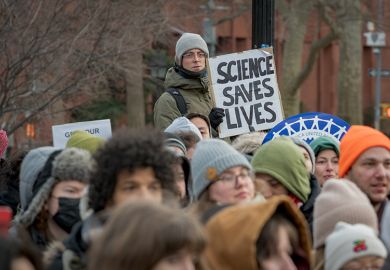A coalition of US veterinary schools and public colleges is pressing the federal government to remove obstacles to gene editing in farm animals that they say are blocking hundreds of critical food-related research projects.
The US has several dozen agricultural and veterinary colleges, and nearly all of them could push ahead needed research on hundreds of projects if regulatory processes were improved, the academic associations are insisting in a new analysis.
“It’s been such a roadblock for years,” said Noelle Cockett, president of Utah State University, who led the just-concluded review for the American Association of Veterinary Medical Colleges and the Association of Public and Land-grant Universities.
The hundreds of projects worthy of research, but which are largely frozen by fear of regulatory chaos, include improving the ability of meat-producing animals to also deliver good-quality milk or wool and improving their disease resistance, Dr Cockett said.
A chief argument of the university groups is that researchers and industry have been using gene-editing insights to crossbreed animals of the same species for decades, yet the rules appear to be getting tougher just because the technical methods of accomplishing the same basic tasks have grown more sophisticated.
Advances including CRISPR-Cas9, the newest and most advanced gene-editing tool, have “so much potential” in such areas, Dr Cockett said, but much of it is stifled “because no university is going to bet on getting this into production at this point”.
Experts warn, however, that the universities are being pulled by the lure of corporate partnerships into a political minefield that’s brought heavy controversy since gene-editing techniques were first developed in the 1970s.
The US Food and Drug Administration (FDA) has primary responsibility for approving genetically modified foods, and it does have a tough approval process, said Jennifer Kuzma, professor of public and international affairs at North Carolina State University.
But that’s not unwarranted given the complexities and potential implications of genetic changes that could become permanent and spread across the food supply, said Professor Kuzma, a co-founder and co-director of the Genetic Engineering and Society Center at NC State.
Research delays attributed to the FDA may be upsetting some universities but could benefit them in the long run if it prevents a dangerous mistake, Professor Kuzma said.
FDA officials said in an interview that their agency recognised such concerns in academia and has been trying both to lessen the regulatory burden and to better explain the processes to researchers.
The FDA does have an expedited process for relatively low-risk genetic alterations in farm animals, where approval can be granted within a few months, said Heather Lombardi, director of the Division of Animal Bioengineering and Cellular Therapies at the FDA’s Center for Veterinary Medicine.
“We need to do a better job of reaching people in academia, in explaining our process a bit better,” she said. The report by the university groups “helps us realise we need to do a better job reaching out not only to academia but to a lot of our different types of stakeholders”.
Register to continue
Why register?
- Registration is free and only takes a moment
- Once registered, you can read 3 articles a month
- Sign up for our newsletter
Subscribe
Or subscribe for unlimited access to:
- Unlimited access to news, views, insights & reviews
- Digital editions
- Digital access to THE’s university and college rankings analysis
Already registered or a current subscriber? Login







